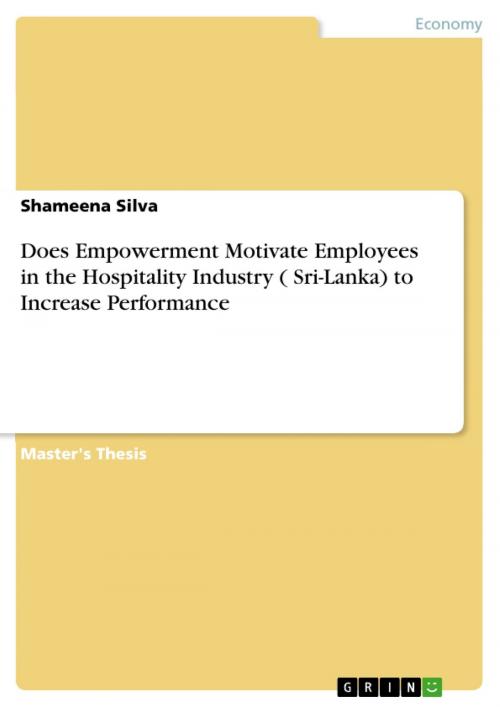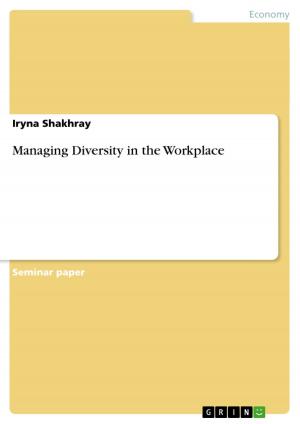Does Empowerment Motivate Employees in the Hospitality Industry ( Sri-Lanka) to Increase Performance
Business & Finance, Human Resources & Personnel Management| Author: | Shameena Silva | ISBN: | 9783640352531 |
| Publisher: | GRIN Publishing | Publication: | June 21, 2009 |
| Imprint: | GRIN Publishing | Language: | English |
| Author: | Shameena Silva |
| ISBN: | 9783640352531 |
| Publisher: | GRIN Publishing |
| Publication: | June 21, 2009 |
| Imprint: | GRIN Publishing |
| Language: | English |
Master's Thesis from the year 2007 in the subject Business economics - Personnel and Organisation, grade: Distinction (70%), University of Wales, Aberystwyth, course: MBA ( Master of Business Administration), language: English, abstract: The study was based on finding out whether empowerment motivates employees in order to increase performance. To do so, empowerment was related to frontline employee job motivation and performance levels. The study report is mainly a descriptive study, based on a random sample of 98 frontline employees dealing with customers, selected from a target population of hotel sector employees in the Sri-Lankan hospitality Industry. The instrument used was a structured questionnaire in order to collect quantitative data, and the study achieved a response rate of 90%. Quantitative analysis based on the bivariate analysis techniques indicates that, empowerment when implemented in the workplace do have a significant positive relationship with motivation of the employees in order to increase performance. In addition, the study also makes a significant contribution to the empowerment theory by showing that, that there is a hidden factor behind the empowerment concept in increasing performance other than by motivating employees, which proposes potential avenues for further research. Too, the study explored in detail to how far was the empowerment practices integrated into the work context, in order to obtain maximum benefits and the sustainable outcome performance in the organization. When it came to analyzing, the prerequisites to empowerment, the conducive climate for empowerment practices and also the empowered environment were specially considered. Although there is a favourable effect on employee motivation and performance through empowered practices, the study shows that the employees are not much empowered in practice in the Hospitality industry in Sri-Lanka. The study also goes on to discuss some of the suggestions on how to empower employees in the work place, in order to maximize service performance improvements.
Master's Thesis from the year 2007 in the subject Business economics - Personnel and Organisation, grade: Distinction (70%), University of Wales, Aberystwyth, course: MBA ( Master of Business Administration), language: English, abstract: The study was based on finding out whether empowerment motivates employees in order to increase performance. To do so, empowerment was related to frontline employee job motivation and performance levels. The study report is mainly a descriptive study, based on a random sample of 98 frontline employees dealing with customers, selected from a target population of hotel sector employees in the Sri-Lankan hospitality Industry. The instrument used was a structured questionnaire in order to collect quantitative data, and the study achieved a response rate of 90%. Quantitative analysis based on the bivariate analysis techniques indicates that, empowerment when implemented in the workplace do have a significant positive relationship with motivation of the employees in order to increase performance. In addition, the study also makes a significant contribution to the empowerment theory by showing that, that there is a hidden factor behind the empowerment concept in increasing performance other than by motivating employees, which proposes potential avenues for further research. Too, the study explored in detail to how far was the empowerment practices integrated into the work context, in order to obtain maximum benefits and the sustainable outcome performance in the organization. When it came to analyzing, the prerequisites to empowerment, the conducive climate for empowerment practices and also the empowered environment were specially considered. Although there is a favourable effect on employee motivation and performance through empowered practices, the study shows that the employees are not much empowered in practice in the Hospitality industry in Sri-Lanka. The study also goes on to discuss some of the suggestions on how to empower employees in the work place, in order to maximize service performance improvements.















